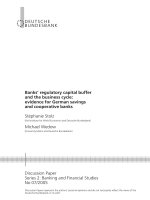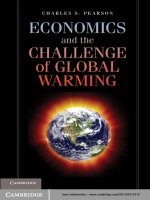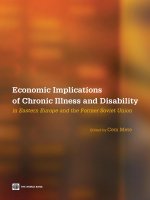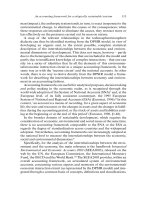Shifting capital mercantilism and the economics of the act of union of 1707
Bạn đang xem bản rút gọn của tài liệu. Xem và tải ngay bản đầy đủ của tài liệu tại đây (1.06 MB, 104 trang )
PalgraveStudiesintheHistoryofEconomicThought
SeriesEditors
AviCohen
DepartmentofEconomics,YorkUniversityandUniversityofToronto,Toronto,ON,Canada
GeoffreyColinHarcourt
SchoolofEconomics,UniversityofNewSouthWales,Sydney,NSW,Australia
PeterKriesler
SchoolofEconomics,TheUniversityofNewSouthWales,Sydney,NSW,Australia
JanToporowski
EconomicsDepartment,SchoolofOriental&AfricanStudies,London,UK
PalgraveStudiesintheHistoryofEconomicThoughtpublishescontributionsbyleading
scholars,illuminatingkeyevents,theoriesandindividualsthathavehadalastingimpacton
thedevelopmentofmodern-dayeconomics.Thetopicscoveredincludethedevelopmentof
economies,institutionsandtheories.
Moreinformationaboutthisseriesathttp://www.palgrave.com/gp/series/14585
AidaRamos
ShiftingCapital
MercantilismandtheEconomicsoftheActofUnionof1707
AidaRamos
UniversityofDallas,Irving,TX,USA
PalgraveStudiesintheHistoryofEconomicThought
ISBN978-3-319-96402-7
e-ISBN978-3-319-96403-4
/>LibraryofCongressControlNumber:2018954336
©TheEditor(s)(ifapplicable)andTheAuthor(s)2018
Thisworkissubjecttocopyright.Allrightsaresolelyandexclusivelylicensedbythe
Publisher,whetherthewholeorpartofthematerialisconcerned,specificallytherightsof
translation,reprinting,reuseofillustrations,recitation,broadcasting,reproductionon
microfilmsorinanyotherphysicalway,andtransmissionorinformationstorageand
retrieval,electronicadaptation,computersoftware,orbysimilarordissimilarmethodology
nowknownorhereafterdeveloped.
Theuseofgeneraldescriptivenames,registerednames,trademarks,servicemarks,etc.in
thispublicationdoesnotimply,evenintheabsenceofaspecificstatement,thatsuchnames
areexemptfromtherelevantprotectivelawsandregulationsandthereforefreeforgeneral
use.
Thepublisher,theauthorsandtheeditorsaresafetoassumethattheadviceandinformation
inthisbookarebelievedtobetrueandaccurateatthedateofpublication.Neitherthe
publishernortheauthorsortheeditorsgiveawarranty,expressorimplied,withrespectto
thematerialcontainedhereinorforanyerrorsoromissionsthatmayhavebeenmade.The
publisherremainsneutralwithregardtojurisdictionalclaimsinpublishedmapsand
institutionalaffiliations.
Coverillustration:Pattern©MelisaHasan
ThisPalgraveMacmillanimprintispublishedbytheregisteredcompanySpringerNature
SwitzerlandAG
Theregisteredcompanyaddressis:Gewerbestrasse11,6330Cham,Switzerland
“SomepeoplehavebeenoftheopinionthatTradeandwarcouldnotgotogether;butthis
isplainlyamistake.”
—CharlesDavenant,DiscoursesonthePublicRevenues,1698
Acknowledgments
Iamgratefulfortheassistanceandencouragementofmany.Firsttomyfamily,especiallymy
brotherRobRamosandmysisterRose,whoencouragedmetotakeSeamusDeane’scourse
ontheActofUnionlongagoatNotreDame.Myresearchasaneconomisthasnotbeenthe
samesince.Iamalsogratefultomyformeradvisor,alsolongagoatND,PhilipMirowski,who
allowedmetobranchsometimesveryfarafieldinexploringtheScottishpoliticaleconomy
andtaughtmehowtomakehardinquiriesofeconomictheory.Theworkhereinisalso
greatlyinfluencedbytheearlyguidanceIreceivedoneconomicdevelopmentfromthelate
Drs.DenisGouletandRoyE.Robbins,whoIwishcouldhavereadit.
IamgratefultotheEdinburghUniversityLibrary,GlasgowUniversity,theUniversityof
NotreDameHesburghLibrary,andtheScottishHistorySocietyforaccesstotheirspecial
collectionsanduseoftheirmaterial;theKingHaggarScholarsAwardfromtheUniversityof
Dallas,whichallowedmetoconducttheoverseasresearchnecessarytocompletethiswork;
andmyHistoryofEconomicThoughtstudentsatUDwhosediscussionsnotonlysharpenmy
thinking,butalsomakemehopefulforthefuture.Ithankthosewhoassistedwithresearch
conversation,company,andhousing,includingAaronB.Fricke,BrigidByrne,AdenaMoore,
andJeffJasinski.IamalsoverygratefulfortheeffortsofallofthestaffatPalgraveMacmillan,
especiallythepatientLauraPaceyandClaraHeathcock.Fortheirencouragement,
incentivization,andcheer,IalsowishtothankElisaGonzales,PatrickGary,KimberlySacher,
andLt.Col.ArmandoValdez.
Lastbutnotleast,Iwouldliketothankmyparents,ReynaldoandBeatrice,whohave
shownmethepowerofanenduringunion.
Abbreviations
EIC EnglishEastIndiaCompany
HMC HistoricalManuscriptsCommission
L GeorgeLockhart’sMemoirs
RPS RecordsoftheParliamentofScotland
WN WealthofNations
Contents
1Introduction
2ThePoliticalandEconomicContestandContext:ScotlandandEnglandBeforethe
Union
3BeyondTrade:MercantilistIdeasofDependency,Value,andTransmutationand
JustificationofUnion
4TrickorTreaty:TheNegotiationandArticlesofUnionintheContextofMercantilist
Ideas
5BalancingAct:TheEquivalent,PoliticalArithmetic,andMercantilistStructural
Violence
6ShiftingCapital
7UnintendedConsequences:ScottishPoliticalEconomyasaReactiontoMercantilism
Index
©TheAuthor(s)2018
AidaRamos,ShiftingCapital,PalgraveStudiesintheHistoryofEconomicThought
/>
1.Introduction
AidaRamos1
(1) UniversityofDallas,Irving,TX,USA
AidaRamos
Abstract
ThischapterdiscussestheimportanceofexaminingtheActofUnionof1707asa
manifestationofmercantilisteconomicthought.PlacingtheUnioninthecontextofeconomic
ideasshedsfurtherlightonboththecontentsofthetreatyandtheactionsoftheEnglishand
ScottishParliaments.Thedefinitionofmercantilismusedinthebook,asystemoftheoryand
policiesthatseekstomaximizenationalpower,isexamined.KeyaspectsofEnglish
mercantilismemployedinlegislationbeforeandduringthenegotiations—warfarewithout
militaryconquest,theideaofsurplus,andparticularnotionsofwealth,power,trade,and
transmutation—areintroduced.Howtheseareconnectedtotheconceptofstructural
violenceisexamined.Theoutlineoftherestofthebookisalsodiscussed.
Keywords ActofUnion,1707–Politicaleconomy–Mercantilism–Structuralviolence–
Scotland–England–Eighteenthcentury–Imperialism–GreatBritain–Power–Development
1.1 EconomicsandtheUnion
OnMay1,1707,arathersplendidsceneunfolded,describedbySirJohnClerkofPenicuik,as
QueenAnneandherretinueof“atleast3or400coaches,”processedtoSt.Paul’sCathedralto
celebratetheUnion.InsideSt.Paul’s:
TheBishopsandPeerssatingalleriesonherMajestie’srighthand,andthelate
membersoftheHouseofCommonsofEngland,withsuchashadbeenchosento
representtheCommonsofScotlandinthefirstBritishParliament,wereonherleft
hand…1
…IobservedarealjoyandsatisfactioninthecitizensofLondon…Thewholeday
wasspentinfeastings,ringingofbells,andilluminations,andIhavereasontobelieve
atnotimeScotsmenweremoreacceptabletotheEnglishthanonthisday.(1892,pp.
68–69)
BellsalsoranginEdinburghonthemorningofMay1.However,ratherthansongsofjoy,
thebellsofSt.GilesCathedraltolledthebittersweettune“WhyShouldIBeSadonMy
WeddingDay?”Therewerenopubliccelebrations.HenryMaule(1707)reportedtotheEarlof
Mar,“Thereisnothingsomuchtakennoticeofheretodayasthesolemnityinthesouthpart
ofBritainandthewantofithere.”AlthoughtheActofUnionhadpassedboththeEnglishand
ScottishParliamentsandbeenratified,thepublicopinioninScotlandwasverymuchagainst
thetreaty.AsevincedbythetellingtuneatSt.Giles,Scotlandhadhadaweddingbutitwas
unclearwhetheritwastobeeitherahappyorfruitfulunion.
TheActofUnionof1707joinedtheparliamentsandfulladministrationofbothnations
intooneGreatBritain.ForScotland,theimplicationsoftheActwerefar-reachingpolitically
andeconomically.TheUnionnotonlydissolvedtheScottishParliament,andreducedthe
numberofnewministers,butalsomovedtheadministrationofthecountryfromEdinburgh
toLondon.AspartofGreatBritain,theScottishpeopleweresubjecttoanewsystemof
taxationandliableforthedebtthatEnglandhadaccruedthroughtheseventeenthandearly
eighteenthcenturies.WhileitisundeniablethatScotlandalsogainedeconomicbenefitsfrom
theopeningoftradewithEnglandanditsoverseasterritoriesandthedevelopmentofthe
domesticfisheriesandmanufacturingguaranteedbythetreaty,thebenefitswereslowto
manifest,anditisequallyundeniablethatthetreatyalsogeneratedeconomiclossesfor
Scotlandinthefirstfourdecadesafteritspassage(Whately1989,pp.169–176).
Publicprotestsinprintandinpersonbothduringandafterthetreatynegotiations
showedthatthepublicsentimentwasagainsttheUnion,asanalyzedinBowie(2007)and
Gibson(1988),andshowninthecontemporaryaccountsthatshallbeusedthroughoutof
ScottishministersGeorgeLockhart(1714)andJohnClerk(1993and1892),andEnglish
observer/propagandistDanielDefoe(1799).Therewasonlyonepublicaddresspresentedto
parliamentinfavorofthelegislation.2AndyetthemajorityofScottishministerspresent
votedinfavorofit.3WerethevotesinfavoroftheUnionamatterofbriberyandacorruption
ofinterestsonthepartoftheministers,asarguedbysomescholars,suchasShaw(1999),
MacInnes(1990),Riley(1964),andFerguson(1977)?Orweretheyamatterofconfrontation
ofthebeliefthatScotland’seconomycouldnotprosperwithoutcloseralliancewithEngland,
asSmout(1969,1964,and1963)argues,andthusUnionwasthebetterchoicethan
continuingtoengageincommercialhostilities?OrwasitsimplyamatterofseeingtheUnion
asawaytosecurethepromisesoftheRevolutionsettlementandtosecureScotlandfroma
returntoJacobitism?Thisbookoffersanalternativeexplanationofboththeconstructionof
theUnionandtheScottishministers’supportforit.
TheUnionhasbeenexploredfromavarietyofviewpoints:asafightagainstuniversal
monarchyandagainstcentrism,asapurelypoliticalexercise,asaninevitabilitydueto
geographyandhistory(Colley1992),asabetrayalofprinciple(Riley1964;Ferguson1977),
andsoon,butneveryetasanexerciseofmercantilism,thedominantsetofeconomic
theoriesofthetime.ThepoliticalandmilitaryreasonswhytheEnglishpursuedtheUnionare
knownandhavebeenextensivelyexplored(MacInnes1990,2007;Shaw1999).4Howeverless
explored,especiallywithintheeconomicsliterature,aretheeconomictheorybehindthe
languageandactionstakenaswellasthosecalledforinthetimeprecedingtheunion
negotiations,thedraftingofthetreaty,anditspassageandimplementation.Althoughthe
economichistoryofScotlandfrombeforeandduringtheUnionhasbeendetailed,most
notablybyT.C.Smout(1963,1964,and1969),R.H.Campbell(1964),T.M.Devine(1985),and
ChristopherWhately(1989),theeconomictheorythatunderlaytheUnionandthatguided
thedraftingofthearticles,fromthecontextofthehistoryofeconomicthought,hasnot.This
isacuriousomissiongiventhatthedominantcontemporaryEnglisheconomicdiscourse,
mercantilism,iswellknown,andthattheperiodthatfollows,theScottishEnlightenment,led
tothedevelopmentofpoliticaleconomyasadiscourse.Andyetthereisadearthofmaterial
thatreflectsupontheinfluenceofeconomictheoryonthecreationoftheUniontreatyandits
passage.5,6
WhiletheeconomichistoryofScotlandandtheUnionreportsontheeconomic
phenomenaoftimesandplaces,providingrichcontextfordiscussionofpolicyandtheory,it
doesnotnecessarilyinvestigatetheeconomicthinkingthatunderliestheinstitutionsofthe
times.ThehistoryofeconomicthoughtcanprovideadeeperanalysisofbothScottishand
Englishinstitutionsinvolved,whetherthoseinstitutionsareformal(legislationregarding
propertyandcommerce)orinformal(opinions,customs,andhabits).Inaddition,itanalyzes
howthoseinstitutionsareformedandunformed,andhowtheyarechangedandinfluenced
overtimeoratoneparticularpointintime.Thus,IwishtoprovideananalysisoftheActof
Unionfromtheperspectiveofthehistoryofeconomicthought.
ScholarlytreatmentsoftheUnionhavetendedtoseparatecontemporaryeconomic
thoughtfromanalysisofthepoliticalaimsoftheUnion’sauthors.Anunderstandingof
particularaspectsofmercantilistthoughtshedslightonboththeconstructionoftheUnion
andthechoicesofitsauthorsandnegotiators.IarguethattheActofUnionwascreated
withinthecontextofseventeenth-centuryEnglishmercantilistthoughtthatbothinformed
andwasformedbyEnglishstatepolicygoalstoremoveanyperceivedexternalthreats,
whethermilitary,political,orcommercial,andfocusedonexpansionthroughtradeandthe
absorptionofresourcesthroughcolonization.ViewingtheUnionasmerelyaboutthe
expansionoftrade,ortheremovalofthethreatofaStuartrestorationandmilitaryconflicton
thenorthernborderignoresanimportantaspectoftheintellectualhistoryoftheperiod,of
howtheprevalenteconomicideasinfluencedtheformationofpolicy.Idonotarguethatthe
otherinterpretationsoftheUnionasapoliticalorsecuritymeasureareincorrect,butonly
thattheyareincomplete.AnalyzingtheactionsofboththeScottishandEnglishministers
throughthelensofcontemporarymercantilistthoughtprovidesadditionalinsightintothe
particularitiesofwhatwasperceivedtobeatstake,whytheUnionpassed,andwhyaspectsof
itweresoproblematictotheScottishpublic.7
Ialsoarguethatthemercantilistthoughtthatinfluencedthedraftingofthetreatyof
Unionwasnovelinthatitachievedthemilitaryandeconomicaimsofthestatewithoutever
engaginginactualarmedorcommercialconflict.Therelevantmercantilisttheoriesthat
influencedtheUnioninvolvetwoformsofviolence:Oneispsychological,thethreatof
violencewithouthavingtoundertakeeithertheexpenseorthephysicalactionofengagingin
amilitaryinvasion,andtheotherisstructuralviolence,whereintheneweconomicand
politicalorderimposedbytheUniontreatyensuredthatonesidealwayshadapoliticaland
economicadvantage.Theseformsofviolencearepreferredtomilitaryactionbyanationstatethatseekstomaximizethesizeofitstreasury,ortheamountofitsborrowing,because
theycomeatlowermonetarycost,butstillaccomplishthestate’smilitaryandmercantile
aims.IstvanHont(2005)impliesthattohavethestateactinthecommercialrealmwastoput
itintoadifferentworldofcommercialaffairs.WhatIargueinsteadisthatmercantilism
exporteditseconomiclogicandrhetoricintothepoliticalrealm.Ratherthanseeingthestate
ashavingtocommititselftomoremilitaryaction,moreself-defenseinordertoassertits
commercialclaims,commercialactivitybecameaformofself-defenseandawayof
reinforcingthemilitarypowerofstatesthatweredominantorsuccessfulintradebecauseit
offerednotonlynewresourcesbutalsonewavenuesbywhichtoasserttheirpowerand
abilitytoincreasetheirmilitarypowerthroughtheincreaseofphysicalandmonetary
resourcesavailabletothestatetreasury.Therebyitisamoreefficientformofmercantilism.
TheActofUnionutilizesthisnewmercantilismandisthusamanifestationofthe
mercantilistprocessesthattheEnglishstateadministrationadoptedintheprotectionand
expansionofEngland’sempire.Thatthisissoisseenintherhetoricandthoughtprocessesof
thoseonbothsidesoftheUniondebateinthecraftingoftheTreaty,whetheritsprogenitors
wereconsciousofitornot.Ananalysisofthesethoughtprocessesandlanguageisthebasis
ofthisbook,andwillrevealtheprevalenceofthemercantilistconceptofthebalance,or
ratherasurplusthatbenefitsonesidemorethananother,asthedominantparadigmthrough
whichtheUnionwasfashioned.Fromtheperspectiveofmercantilisteconomicthinking,it
canbeshownthatdespitethebenefitsthatwereextendedintheUniontoScotland,the
EnglishministersdesignedthetreatysuchthatEnglandeitherbrokeevenor,inothercases,
alwaysmaintainedaseriesofadvantages,whichimpactedbothScotland’seconomic
outcomesandthefurtherdevelopmentofeconomictheory.
1.2 Mercantilism:Growth,Power,andViolence
AnexplorationoftheideasofEnglishmercantilismembeddedintheUnionisessentialto
understandingitscreationandoutcomes,andthereceptionandreactiontoitsoutcomes.The
ministersofbothsidesmaynothavealwaysbeenconsciouslyparticipatinginmercantilist
paradigms,buttheiractionsandeventhepoliciestheyvoteduponwereoftencoloredbya
largermercantilistworldview.AsJohnMaynardKeyneswrote,“Theideasofeconomistsand
philosophers,bothwhentheyarerightandwhentheyarewrong,aremorepowerfulthanis
commonlyunderstood…Practicalmen,whobelievethemselvestobequiteexemptfromany
intellectualinfluences,areusuallytheslavesofsomedefuncteconomist”(1936,p.383).I
arguethattheideasofcertainmercantilistthinkerswerenotonlyverymuchalivebutwere
pivotaltothecreationoftheUnion.
MyargumentfocusesnotonallfactorsofmercantilisminrelationtotheUnionbuton
certainaspectsofmercantilistthoughtandrhetoric,inMcCloskey’s(1998)senseoftheentire
setofarguments,logic,andevidenceusedtopersuade,thatwerebroughttobearonthe
craftingoftheUnionthathavebeenoverlookedorunderemphasizedintheliterature.The
economicaspectsoftheArticlesofUnionanditsdraftinghaveoftenbeenexaminedonlyin
relationtotrade.While,ofcourse,tradeisapivotalfoundationofmercantilisttheoryand
policy,therearemorecomplexideasdevelopedinmercantilistwritingtojustifycertain
actionsregardingtradeandpolitics.AdamSmithcharacterizedthe“mercantilesystem”in
theWealthofNations(1776)asconflatingwealthwithspecieandwhose“ultimateobject,
however,itpretends,isalwaysthesame,toenrichthecountrybyanadvantageousbalanceof
trade”(IV.8.1).8Helaterpointstothetrueerrorofthesystembeingitsfocusonproduction
forexportratherthanonconsumptionandhenceitsmisallocationofresources,butthe
criticismregardingwealthandspeciepersistedintheliterature.Whilealloftheeconomic
interpretationsofmercantilismhaveidentifiedthecommonelementofpromotinga
favorablebalanceoftrade,thereasonsgivenwhythestateshouldpursuesuchapolicytend
tofallintotwobroadcategories.Althoughtradeandproductivityisextremelyimportantto
mercantilisttheory,itencompassesamorecomplexsetofideasthantradealone.
OnelineofthoughtfollowsSmithinassertingthatthegoalofmercantilistpolicyisthe
materialbettermentofthenationthroughthepursuitofspeciegainedbytrade.J.R.
McCulloch,RichardJones,JohnIngram,andJacobVineradheredtothisposition.Theother
interpretationofmercantilismseesitasatoolforbuildingpoliticalpowerthrougheconomic
means.Thenineteenth-centuryGermaneconomistsGustavSchmoller,WilhelmRoscher,and
FriedrichListseetheaccumulationofbullionthroughtradeasalogicalmeansofstatebuildingintheearlynationalperiod.EliHeckscher(1935)arguesthatthegoalisthe
maximizationnotofthestate’swealthbutofthestate’spower.Thewealthgeneratedthrough
mercantilistpoliciesandpracticesallowsthestateasourceoffundstoconsolidateand
extenditspowerbyalsoconsolidatingandextendingitsterritory.Wealthandplentywill
likelyresult,butinthisviewmercantilismusestradeandmoneypoliciestobothexerciseand
increaseitspower.
LarsMagnusson(1994and2015)fallsintothelattercategorybutalsocontendsthat
mercantilistdiscourseandpracticerevealthatwealthandpowerwereviewedas
synonymousratherthanasmeanstoanend;bothareends.Anyattempttoenrichthenation
isultimatelyameanstobolsterthestate’spowerratherthantoincreasethenumberofgoods
forimprovedqualityoflife.Economicactivityismanipulatedtoachievethestate’sgoals,
suchasrestrictingthetradeofrivalcountries,andpoliticalactivityisusedasameansto
achieveeconomicgoals,suchasthegrantingofofficialmonopoliestoestablishcontrolover
traderoutes.AsMagnussonstates,“Thustradenecessitatedpowerbut—atthesametime
powerwasafunctionofplentyandtrade”(1994,p.152).Bothareexpressionsofstatepower,
andthemaximizationofthiskindofpowerisconceptuallydifferentthanmaximizingspecie
forfundingofstateunificationorincreasedlivingstandards.BothEnglandandScotland’s
policiesintheseventeenthandeighteenthcenturiesfitintoMagnusson’sframework.For
instance,England’srestrictionoftradeforcoloniesandcountriesviewedaspotentialthreats
toitsoverseasdominanceoftrademakessenseinaworldviewwheremaximizingtrade
routesisameanstointernationaldominance.Somewriters,suchasWilliamPetty,wroteto
justifytheirownpolicyproposals(Hutchison1988,pp.29–30).Meanwhile,CharlesDavenant
oftenwrotetojustifytheproposalsoftheEnglishgovernment(Waddell1958;Somers1730).
Whetherthetheoryandpolicyofmercantilismischaracterizedasaschoolofthought,arentseekingactivity(EkelundandTollison1981),asetofpolicies,oranapproachtogenerating
solutionsforspecificproblems(VaggiandGroenewegen2003,p.16),theendgoalof
mercantilistwritingisthesame:toenactpoliciesthatmaximizedthewealthandpowerofthe
nation-state.
Magnusson’sdefinition,however,underestimatesthemartialaspectofthefavorable
balanceoftrade/zero-sumviewofexchangepromotedbymercantilistpolicyandliterature.
Animportantsignofoverseasdominationisnotonlytheexpansionofterritorybutalsothe
abilitytogrowanddeployyourmilitaryoverseastodefendthatterritory.Mercantilismis
thusalsoanideologyofexpansionthroughforce,withinternationaltradeservingasone
meanstothatend.Magnusson’sperspectiverecognizestheroleofpowerandgrowththrough
expansioninatimeofexpandingnation-states,andthehallmarksofnationalpower:
commandoverspecietofundstateexpendituresandcontroloverterritoryandtraderoutes.
SternandWennerlind’s(2014)observationthattheadministrationsofthenation-statesof
theperiodwerenotasorganizedashasperhapspreviouslybeenassumed,ratherthan
counteringtheorganizationalfeaturesofmercantiliststatepolicy,reinforcestheneedforit.
Theadministrationsoftheperiod,whetherorganizedordisorganized,imposedvarious
tariffs,grantedbounties,passedlawsregardinglaborandproductionregulations,and
grantedmonopoliesandprivilegestoprivatetradingcompanies,eveniftheydidsoatthe
behestofcompetingfinancialandcommercialdomesticinterests.
Thebalancemetaphorhasalonghistoryineconomicthought.AsAndreaFinkelstein
(2000)demonstrates,theexaminationinthephysicalsciencesofthebalanceofforces
influencedeconomicthinkingintheseventeenthcentury,andwasalsoinfluencedbythe
emergenceofdouble-entrybookkeeping.Anotherinfluencethatsheclaimsisfoundinevery
contemporarypamphletpromotingatradesurplusisCato’sdictum,thateveryhousehold
shouldbeasellerratherthanabuyer(p.91).9Ratherthanseeingabalanceasmaintaininga
harmoniousbalanceandexchangeofequivalentsasinGreekandScholasticthought,in
Englishmercantilisttheorytheemphasisisnotonanevenbalance,butasurplusofexports
orpositivebalance.
SalimRashid(1993)showsthatinthecontemporaryEnglishliteraturethephrase
“positivetradebalance”isalwaysusedinthecontextofEngland’songoingconflictswith
Franceandthetradebalancewiththatcountry.Wealthisthusemphasized“becausetheword
‘wealth’carrieswithitconnotationsofbothrichesandpower”(p.140).Tradeisdiscussed
andunderstoodwithintheframeworkofthepoliticsoftheperiodandthereforeisputatthe
serviceofgeopoliticalpowergamesintheseventeenth-andearlyeighteenth-century
pamphletliterature.Thus,Englishmercantilistliteratureiscraftedtoadvanceaparticular
powerstructureoftheEnglishnation-stateinrelationtootherstates.Expansion,
competition,anddominanceareseenasnecessaryactionsthatmaximizethepowerofthe
nation-state.
Idefinepowerastheabilitytocontrolorlimittheactionsofothers,whichdefinitionis
influencedbytheworkofdevelopmentethicistDenisGoulet.FirstoutlinedinTheCruelChoice
(1971),Gouletanalyzedthepostcolonialrealitiesoflesser-developedcountriesandthe
actionsofdevelopedcountriesthatcontinuedtopreventformercoloniesfromexercisingfull
agency.However,theconceptappliesintheseventeenthandeighteenthcenturiesaswell.
Thepurposefulcraftingofpolicyinordertolimittheactionsofcountriesthatoneperceivesa
realorpotentialthreattothedominanceofthenation-stateisamercantilistaction.Thegoal
intakingsuchactionsisbothtolimitthepossibilityofcompetitionandtothereforeexpand
thedominantnation-state’spotentialarenaforaction.Ontheempireoftheseas,touse
Armitage’s(2000)phrase,tolimitanothercountry’sabilitytotradeallowsthepossibilitythat
onecanseizetheother’smarketorcontinuetheexpansionofone’smarketinaparticular
tradearea.10Topreventacountryfromevenbeingabletoparticipateinthewiderempireof
theseasisanevenmoreeffectivecounter,aswasthecasewithIreland.Throughthislens,the
purposeofmercantilisteconomicpolicyandactivityistolimitandexpandcertainactionsin
ordertoexpandtheactivitiesofthenation-state,whetherinthepresentorthefuture.It
seekstolowerinputcostsgainedatthedisadvantageofitscoloniesanddependent
territories,andtomaximizetheabilitytoexpandanddeployanavyandastandingarmyat
will,sothattheactionsofrivalsandpotentialrivalsseekingexpansionoftrade,territory,or
accesstophysicalorfinancialresourcescanbearrested.
Althoughitistruethattheviewofwhetherwealthwasfiniteorinfiniteshiftedoverthe
courseoftheseventeenthandintotheeighteenthcentury,theconceptthattherehadtobea
winnerandaloserinanyinteraction,usuallyattachedtotheideathatresourcesoftheworld
werefixed,remainedinplace.Foremergentnation-statesstrivingtobethewinner,they
couldimposeconditionsthatwouldensuretheywerethewinners.TheActofUnionisone
suchinstanceofthis.Themercantilistmentalityprovidesanadditionalexplanationofwhy
theEnglishusedsuchharshtacticstobringtheScottishministerstothenegotiatingtable,in
thedraftingoftheTreaty,andwhytheScottishMPs,giventheimbalanceofpoliticaland
commercialpower,hadlittleleveragetobendthetreatytotheircountry’sfullerbenefit.This
explanationalsoprovidesareasonwhytheScottishMPseventuallysignedthetreaty,despite
thepopularopinionagainstandmanyoftheirownreservations:Inamercantilistworld,there
wasstill,evenafterthefailureoftheScottishcolonyatDarien,orperhapsbecauseofit,nota
wayforthemtobecometheclearwinnerrelativetoEngland.
Theadoptionofmercantilistlogicwasnotone-sided.IarguethatboththeEnglishandthe
Scottishnegotiatorsusedmercantilistlogicandrhetoricintheirargumentsandproposals.A
workthatcomesclosesttotheaimsofthisbookisDavidArmitage’s(1995)discussionof
Scotland’svisionofempire.Withoutstrictlysayingso,hisanalysisofScotland’sactionsto
furtheritseconomicinterestsintheyearsbeforetheUnionshowsthattheyareworking
withinamercantilistparadigm.TheformationoftheCompanyofScotlandandattemptsat
colonizationinDarienandelsewherearetheforemostexamplesofamercantilist,imperialist
worldview.Suchmercantilistthinkingisstarklypresentinthespeechesandwritingofthe
ScottishministersofparliamentnegotiatingtheUnion.Thedominanceofthisframework
wassuchthatitcausedothermodelsofuniontobedismissed.AndrewFletcher’sproposalfor
federalunionandtheearlierActofSecuritypassedbytheScottishParliamentwereonly
acceptableifonewaswillingtocastasidemercantilistnotionsofwealth,valueandvaluation,
andgrowth,andthenecessityofforcetoattainthem.
1.3 MercantilismandVariantsofViolence
Mercantilismisinherentlyviolentduetoitsinternallogicthatonemustattainasurplusor
advantageoverothersineveryinteraction.Suchviolencehasbeenoverlookedinthe
literaturebutwasapparenttocontemporarywriters.AdamSmithrecognizedtheaggression
andmanipulationusedtobringaboutthepositivebalanceonedesiredinmercantilist
thought:
Mercantilejealousyisexcited,andbothinflames,andisitselfinflamed,bytheviolence
ofnationalanimosity:Andthetradersofbothcountrieshaveannounced,withallthe
passionateconfidenceofinterestedfalsehood,thecertainruinofeach,inconsequence
ofthatunfavourablebalanceoftrade,which,theypretend,wouldbetheinfallibleeffect
ofanunrestrainedcommercewiththeother.(WNIV.3.42)
Itisatheorythatinattemptingtohurttheotheralsohindersone’sowneconomicactivity.
WilliamPaterson,founderoftheCompanyofScotland,opinedthattrade,“withinthelastTwo
Ages,ithathmadegreateralterationsintheseplacesoftheworldthanthesword”(1701,p.
2).
ScottishparliamentarianandpoliticalphilosopherAndrewFletcherofSaltouncertainly
sawmercantilistlogicandthepotentialviolenceinherentintheUnion.InAccountofa
Conversation,hediscussesthepossiblefurtherdiscouragementofScottishtradeiftheUnion
shouldcometopass:
Tradeisnottheonlythingtobeconsideredinthegovernmentofnations:andjustice
isdue,eveninpointoftrade,fromonenationtoanother.Foreverygoodgovernment
hasalwaysencouragedindustry,becauseallmankindhavearighttothefruitsoftheir
ownlabor.Andonthataccountallgovernmentswhichputdiscouragementsonthe
industryoftheirsubjectsarenotuponarightfoot;butviolent,andconsequently
unjust.(1703,p.418)
TheEarlofSeymourrepliesthatFletcherspeaksofinjustice,“butIspeakofadvantage.”
Fletcherrespondsthatifanationproceeds“totakeawaybyforceanyadvantagethatbelongs
toaneighboringpeople,younotonlydoinjusticetothem,butinjureyourselfbytheexample”
(p.429).Thewinner-takes-allparadigmthusinsteadproducestwolosers.
Therhetoricofmercantilismincludesalanguageofviolence,whichcanbepoliticalor
economic.Davenantwrote,“SomepeoplehavebeenoftheopinionthatTradeandwarcould
notgotogether;butthisisplainlyamistake”(1698,p.399).Onecanseethisinthephrase
“RoughWooing”usedinconjunctionwithEnglisheffortstoenticeatdifferenttimesthe
ScottishandtheIrishtocooperateinwithEngland’sgoals.Defoe’spoemCaledonia(1706)
containsthejarringconclusionthat“whenshe’sforcedshe’sfree/Aperfectprostituteto
industry”andthatScotlandwoulddobettertosubmittoEnglishdominanceandhaveaUnion
(p.59).EvenEnglishparliamentariansconcurredthattheuseofviolencewaspartofthe
methodologyoftheUnionprocess.SirJohnPakington,oneofthemostvocalEnglishTory
opponentsofthetreaty,saidtheUnion,“waslikemarryingawomanwithoutherconsent:An
UnionthatwascarriedonbyCorruptionandBriberywithinDoors,andbyForceandViolence
without”(inMurdoch2008,p.80).Anon-forcefuloptionwasnotofferedbecauseitisnot
possibleinthemercantilistframework.ThelanguageofthepetitionsforandagainstUnion
alsoacknowledgesthisrealityofmercantilisteconomicviolence.
TheviolenceinherentinthetradelawsandhencetradepatternsestablishedbyEnglish
mercantilistpolicyareaformofstructuralviolence,asaresomeofthetermsoftheArticlesof
UnionandtheeconomicreasonsthatcausedScotlandtoentertreatynegotiations.Iusethe
termasdefinedbyPaulFarmer(2005)inhiswritingoneconomicdevelopment.Structural
violenceoccurswheninstitutions,againwhetherformalasencodedinlaworinformalas
encodedinattitudes,customs,andbeliefs,arestructuredinsuchawayastolimitothers’
agency.InthecontextoftheUnion,structuralviolenceisusedbothtoforcepeopletomake
choicesconsistentwithEnglishgoalsandlimitthepossibilitiesforexpansionofthoseforced
oncethechoicesaremadeandpoliciesimplemented.Onthewholeitwasaveryeffective
meansforEnglandtoexpanditsempirewithouthavingtoengageintheexpenseofmilitary
conquest.Militarythreatpriortoaneconomicagreementissufficienttoattainthe“empireof
theseas”orsimilarlyorwhatamountstothesame,the“empireofcommerce.”Theformof
powermanifestationinEnglishmercantilismisnotjustphysicalbutalsofinancial.AsKnights
(2016)andGauci(2001)haveshown,mercantilismrequiredtheparticipationofavarietyof
players.Theriseoftradingcompaniesandthesubscriberswhounderwrotethemmeantthat
advancinganationalpolicybyagovernmentrequiresthecooperationofanetworkof
personsoutsideoftheformalgovernment:merchants,financiers,andsubscribers.Because
merchantsandsubscribershavevestedinterestsinmaximizingtheirprofitontheonehand
anddividendsontheother,theinterestsoffinancialmercantilismisnotnecessarilyinthe
interestsoftheaveragepersonofthenation.Thebenefittothemajorityofpeoplewould
dependonanyparticularprojectbeingpursued.
TheUnionwasmerelyacontinuationofthemaximizationofEnglishstatepowerand
deterrenceofthepowerofothercountries,andthustheviolencecarriedoverintothe
formationofUnionaswell.Structuralviolenceisnotsimplyamatterofrent-seekingbutof
purposelymanipulatingasituationsuchthatanothergroupofpeopleareatadisadvantage.
Indeed,DavenantwrotethattheEnglishshouldnotjustmaximizeexportsoverimportsbut
that“manythingsmustperhapsbedonetothwarttheinterestsofothernations”(1698,p.
424).Fletchersawthistoo,asevidencedinthequoteregardingtheactiveremovalofone
party’sadvantage.TheTreatyofUnionthereforewasnotsimplyamatterofstructuring
governance,taxes,andtradeinEngland’sfavorbutalsoinScotland’sdisfavor.
IagreewithWhately(2008)thattheunionnegotiationsweremorecomplexthana
strugglebetweenanall-powerfulEnglandandaunitedandpoverty-strickenScottish
opposition(p.18).Iarguethatbothsidestendedtoviewtheirsituationrelativetoeachother
inmercantilistterms,andthatwithinsuchaviewoftheworld,duetoitsimbalanceof
commercialandmilitarypower,thatEnglandwasabletonegotiateatreatythatputitselfata
structuraladvantageintothelongterm.Bothusedthepositivebalancemodeltoassesstheir
actionsinthenegotiations.TheScottishministersfocusedonfreetradewiththecoloniesas
theirmajorgain.MeanwhileEnglandhadalonger-termview.JustasThomasMun(1664)
suggested,oneshouldviewimportsofresourcesasseedsforgreaterexports,England
negotiatedforalong-termharvest.England,morepracticedinmercantilistthinking,ensured
theirgainsinpowerinparliamentaryrepresentation,thelocationofthecapital,debtservice,
increasedtaxrevenue,andaccesstoincreasedfinancialandphysicalcapital.Thisisnotto
arguethatScotlandreceivednoeconomicbenefitswithintheunionframework,becauseit
certainlydid.However,itistosaythatignoringtheintellectualmindsetoftheministerswho
drafted,negotiated,andvotedontheunionistooverlookthestronginfluenceofmercantilist
economicthoughtintheshapingofGreatBritain.
1.4 ShiftingCapital
TheUnionisworthyofenduringinterestandinvestigation.EvenbeforetheBrexitconflictor
theoppositiontoTorypolicyinthe1980s,conflictsofeconomicvisionbetweengroupsin
ScotlandandEnglandcanbeobservedgoingbackto1707.Thebasicquestionsofwhether
ScotlandshouldorcouldsurviveeconomicallyapartfromBritain,howitwoulddoso,
whetherthecurrentsituationisfair,andifamoredevolvedgovernmentispreferableto
disunionalsopersist.Whileitmaybetruethatsharinganislandlandmassmayeventually
causedifferentnation-stateswithinittoeventuallymergeintoone,theActofUnionas
devisedin1707wasneitherinevitablenorenteredonequalterms.IarguethattheUnion,and
actionstakenbytheEnglishstateprevioustothedraftingofthetreatytocoercetheScottish
ministerstoopennegotiations,wasnotmerelyasolutionforbothcountriestothepersistent
militaryandcommercialthreatseachnationposedtotheother,butapurposefulmercantilist
measureonthepartoftheEnglishstatetoexerteconomicandmilitarypoweroverthe
Scottishstate.TheActofUnioncanbeseenasamanifestationofamercantilisteconomic
theorythatdominatedEnglishstatecraft.
ThepurposeofthemaneuveringsofmercantilismandoftheUnionistohavecontrolover
resourcesandtheirallocation.Thetitleofthebook,ShiftingCapital,referstoboththe
movementofEdinburgh’scapitaltoLondonandthemovementofministers,resources,and
people,orofphysical,financial,andhumancapital,intoEngland’scommandandcontrolin
manufacturing,themilitary,andadministration.Withasurplusofgoods,people,and
resources,theUnionensuredthatEnglandemergedthewinner,fromamercantilist
perspective,initsengagementwithScotland,asshallbearguedinthefollowingchapters.
ThemovementtowardUnionasresultofmercantilistforcesbeganbeforethedraftingof
theTreaty.Chapter2exploresthepoliticalandeconomiccontextofScotlandbeforethe
Unionandthefactorsthatcausedthemtoenterthetreatynegotiations.Theywerebothat
theeffectofEnglishmercantilistpoliciesandenactedtheirownmercantilist
countermeasures.AspreviouslydiscussedbyDavidArmitage(1995),Scotlandtoohad
encounterswithmercantilistimperialistgoalsandwithresistancetoEngland’sforeignpolicy
interferingwiththeirtrade.Theconsequencesofsuchactivitiesandengagementwiththe
mercantilistworldview,Iargue,leadmanyoftheScottishministerstoseeUnionasthebest
solutionandtodiscardalternativeplansforScotland’sgrowth.
Chapter3focusesonelementsofmercantilistthoughtandrhetoricintheworksof
ThomasMun,WilliamPetty,andCharlesDavenant,pamphleteersfromthreedifferenterasof
Englishmercantilism.Whilethereweremanyothervoicesinthemercantilistpamphlet
literature,thesethreearearepresentativesampleofmercantilismthatfocusesonthe
maximizationofstatepowerandthatadvocatesdoingsoattheexpenseofothernations,
evenone’sownalliedterritories.Theseauthorswerealsothemostwidelyknownbythe
readingpublicandgovernmentministerswhodraftedtheTreatyofUnion.Therearedifferent
strandsofthoughtintheworksoftheseauthors,butIfocusonthoseregardingpower,trade,
defense,anddependency,andhowtheywereputintheserviceofmaximizingthepowerof
theEnglishstateandminimizingthepowerofIrelandandScotland.Theargumentsmadeby
thepamphleteersregardingthethreatandyetdependentstateofIrelandismademoresubtly
inrelationtoScotlandbutisreplicatedneverthelessintheargumentsusedtojustifythe
Union.Theirargumentsregardingself-defense,resourceallocation,andtransmutationare
salienttothedevelopmentoftheArticlesofUnion.
AnanalysisofboththeargumentsforUnionandtheArticlesofUnionasanexercisein
mercantilismispresentedinChap.4.AlthoughoftentreatedasavictoryforScotlanddueto
freetrade,itwillbeshownthatthetermsoftheTreatyensuredthatEnglandwouldincurno
lossesinamercantilistsensedespiteeveryseemingconcessionmadetoScotland.Theways
inwhichthelogicofpoliticalarithmeticisusedtoconferrationalityinthewritingofthe
ArticlesofUnion,whicharesometimesveryirrationalinhindsight,areshowntobeelements
ofmercantilistlogic.Thus,thevotesoftheScottishministersaremademorecomprehensible
asIarguethatthemajorityofthemareviewingthesituationthroughamercantilistlens.In
particular,theEquivalent,thepromisedcompensationfortheinconveniencesandlossesof
theUnion,willbeexaminedinChap.5asamanifestationofmercantilistlogicandpolitical
arithmetic.
Ifthemercantilistworldviewisoneinwhichthetotalwealthoftheworldorinany
relationshipisfixedandonemustalwaysseektoemergeeitherwithanevenbalanceor
preferablytohavegainedfromtherelationship,whatwasitthatshiftedwiththeUnion?
Chapter6analyzesthe“gains”and“losses”ofbothScotlandandEnglandfromthe
mercantilistviewpoint.Inparticularthemovementtowardsecurityandtheabsorptionof
differentformsofcapitalareexploredinthetransmutationofEnglandandScotlandinto
GreatBritain.TheconcentrationofpoliticalcapitalinLondonandinthenumberofEnglish
parliamentarians,eachaformofstructuralviolence,ensuredthatScottishinterestscould
alwaysbeoutvotedwhennecessary.However,theless-immediateandmoreimmaterialgains
Scotlandmadefromthemovementofitspoliticalcapitalandthedevelopmentofitshuman
capitalpavedthewayfortheintellectualadvancesoftheeighteenthcentury.
Scottishpoliticaleconomythusismadepossiblebyandisalsoananswertothe
conditionsandcausesoftheUnion.Chapter7examinesthealternativetomercantilism,an
unintendedconsequenceoftheUnion,developedintheworksofSirJamesSteuartandAdam
Smith.AlternativesolutionsforScotland’seconomicproblemswereproposedbothbefore
andduringtheUnionnegotiations.Fletcher’sproposalsinparticularforafederalunionand
thelimitationsoftheActofSecuritypassedbytheScottishParliamentwereoneoption.It
wasrejectedhoweverinfavoroftreatingforunionnotduetoalackofviabilitybutforalack
ofcompatibilitywiththemercantilistworldview.TheoutcomesoftheUnion,bothplanned
andunplanned,laidthefoundationfortheemergenceofarejectionofthemercantilist
worldviewinScottishpoliticaleconomy.SteuartandSmithdemonstrateanewvisionof
economicstrength,value,andindependencethatfocusesondevelopmentandgrowthfrom
domesticinterdependentproductionratherthaninternationalcommercialwarfare.Scottish
politicaleconomyisthusbothareactionagainstmercantilismandanadaptationtothe
changeswroughtbytheUnion.
References
Armitage,D.1995.IntellectualOriginsoftheDarienVenture.InAUnionforEmpire,ed.J.Robertson,97–118.Cambridge:
CambridgeUniversityPress.
———.2000.TheEmpireoftheSeas,1576–1689.InTheIdeologicalOriginsoftheBritishEmpire,100–124.Cambridge:
CambridgeUniversityPress.
[Crossref]
Bowie,K.2007.ScottishPublicOpinionandtheAnglo-ScottishUnion,1699–1707.Suffolk:BoydellPress.
Campbell,R.H.1964.TheAnglo-ScottishUnionof1707II,TheEconomicConsequences.EconomicHistoryReview16:455–477.
Clerk,J.1892.InMemoirsoftheLifeofSirJohnClerkofPenicuik,ed.J.Gray.Edinburgh:T.andA.ConstablefortheScottish
HistorySociety.
———.1993.HistoryoftheUnionofScotlandandEngland,trans.anded.D.Duncan.Edinburgh:TheScottishHistorySociety.
Colley,L.1992.Britons:ForgingtheNation,1707–1837.NewHaven:Yale.
Cooke,A.,andI.Donnachie,eds.1998.ModernScottishHistory,1707tothePresent:MajorDocuments.Edinburgh:Tuckwell
Press.
Davenant,C.1698.DiscoursesonthePublicRevenuesandontheTradeofEngland.InThePoliticalandCommercialWorks,ed.C.
Whitworth,vol.1,127–459.London:T.Cadell,1771.
Defoe,D.1706.Caledonia:APoeminHonouroftheScotsandtheScotsNation.Edinburgh:AndrewAnderson.
———.1799.TheHistoryoftheUnionbetweenEnglandandScotland.Dublin:JohnExshaw.
Devine,T.M.1985.TheUnionof1707andScottishDevelopment.ScottishEconomicandSocialHistory5(1):23–40.
[Crossref]
Ekelund,R.,andR.Tollison.1981.MercantilismasaRent-SeekingSociety.CollegeStation:TexasA&MUniversityPress.
Farmer,P.2005.PathologiesofPower.Berkeley:UniversityofCaliforniaPress.
Ferguson,W.1977.Scotland’sRelationswithEngland:ASurveyto1707.Edinburgh:TheSaltireSociety.
Finkelstein,A.2000.HarmonyandtheBalance:AnIntellectualHistoryoftheSeventeenthCentury.AnnArbor:Universityof
MichiganPress.
[Crossref]
Fletcher,A.1703.AccountofaConversation.InThePoliticalWorksofAndrewFletcherofSaltoun.London:A.Bettesworth,C.
Hitch,andJ.Clarke,1732.
Gauci,P.2001.ThePoliticsofTrade:TheOverseasMerchantinStateandSociety,1660–1720.Oxford:OxfordUniversityPress.
[Crossref]
Gibson,J.S.1988.PlayingtheScottishCard:TheFranco-JacobiteInvasionof1708.Edinburgh:EdinburghUniversityPress.
Goulet,D.1971.TheCruelChoice:ANewConceptintheTheoryofDevelopment.NewYork:Atheneum.
Heckscher,E.1935.Mercantilism.London:Routledge.
Hont,I.2005.JealousyofTrade.Cambridge:BelknapPress.
Hutchison,T.1988.BeforeAdamSmith.Oxford:BasilBlackwell.
Keynes,J.M.1936.TheGeneralTheoryofEmployment,Interest,andMoney.London:Macmillan.
Knights,M.2016.RegulationandRivalInterestsinthe1690s.InRegulatingtheBritishEconomy,1660–1850,ed.P.Gauci,75–93.
London:Routledge.
Lockhart,G.1714.MemoirsConcerningtheAffairsofScotlandfromQueenAnne’sAccessiontotheThronetotheCommencement
oftheUnion.London:BooksellersofLondonandWestminster.
MacInnes,A.1990.InfluencingtheVote:TheScottishEstatesandtheTreatyofUnionof1706–7.HistoryMicrocomputerReview
2:11–25.
———.2007.UnionandEmpire:TheMakingoftheUnitedKingdomin1707.Cambridge:CambridgeUniversityPress.
[Crossref]
Magnusson,L.1994.Mercantilism:TheShapingofanEconomicLanguage.London:Routledge.
[Crossref]
———.2015.ThePoliticalEconomyofMercantilism.London:Routledge.
[Crossref]
Maule,H.1707.LettertotheEarlofMar,May1,1707,inHistoricalManuscriptsCommission.ReportontheManuscriptsofthe
EarlofMarandKellieCollection.London:HMSOffice,1904,p.389.
McCloskey,D.1998.TheRhetoricofEconomics.Madison:UniversityofWisconsinPress.
Mun,T.1664.England’sTreasurebyForraignTrade.London:ThomasClark.
Murdoch,A.2008.TheLegacyofUnionisminEighteenth-CenturyScotland.InScotlandandtheUnion:1707–2007,ed.T.Devine,
77–90.Edinburgh:EdinburghUniversityPress.
NationalRecordsofScotland.1707.ApproveoftheActRatifyingandApprovingtheTreatyofUnion,16January1707,
RH18/4/14.
Paterson,W.1701.Proposals&ReasonsforConstitutingaCouncilofTrade.Edinburgh.
Rashid,S.1993.MercantilismasaRent-SeekingSociety?InMercantilistEconomics,ed.L.Magnusson,125–142.NewYork:
Kluwer.
[Crossref]
Riley,P.W.J.1964.TheEnglishMinistersandScotland,1707–1727.London:TheAthlonePress.
Shaw,J.S.1999.ThePoliticalHistoryofEighteenth-CenturyScotland.London:Palgrave.
[Crossref]
Smith,A.1776.AnInquiryintotheNatureandCausesoftheWealthofNations.London:A.MillarandT.Cadell.
Smout,T.C.1963.ScottishTradeontheEveoftheUnion.Edinburgh:OliverandBoyd.
———.1964.TheAnglo-ScottishUnionof1707.I.TheEconomicBackground.TheEconomicHistoryReview16(3):455–467.
———.1969.TheRoadtoUnion.InBritainaftertheGloriousRevolution,ed.G.Holmes,176–196.London:Macmillan.
Somers,J.1697.ALetter,BalancingtheNecessityofKeepingaForceinTimeofPeace.London.
———.1730.TheTrueSecretHistoryoftheLivesofAlltheKingsandQueensofEngland,2vols.London:D.Browne.
Stephen,J.2007.ScottishPresbyteriansandtheActofUnionof1707.Edinburgh:EdinburghUniversityPress.
[Crossref]
Stern,P.,andC.Wennerlind.2014.MercantilismReimagined.Oxford:OxfordUniversityPress.
Vaggi,G.,andP.Groenewegen.2003.AConciseHistoryofEconomicThought:FromMercantilismtoMonetarism.NewYork:
PalgraveMacmillan.
[Crossref]
Waddell,D.1958.CharlesDavenant(1656–1714)—ABiographicalSketch.TheEconomicHistoryReview11(2):279–288.
Whately,C.1989.CausesandConsequencesoftheUnionof1707:ASurvey.ScottishHistoricalReview68(186):150–181.
———.2008.TheScotsandtheUnion.NewYork:ColumbiaUniversityPress.
Footnotes
1 Originalspellingsfromprimarysourceshavebeenpreservedthroughoutthetextinquotedmaterial.
2 TheonlyletterofpetitioninfavoroftheUnioncamefromtheBurghofMontroseonOctober15,1706.Ratherthanan
enthusiasticendorsementoftheArticleshoweveritismoreapieceofeconomicfatalism.The“advantageoftheUnion,”the
petitionsays,isitseliminationofthe“EnglishProhibitoryLawes”oftheAlienAct.Ifthelawsweretobereenacted“asthey
undoubtedlywill,weshallbedeprivedoftheonlyvaluablebranchofourtradebywhichthebalanceisonoutsideandthenone
needsnotthegiftofProphecytofortellwhatshallbethefateofthispoormiserableblindednationinafewyears.”TheUnion
wasseennotasaliberatoroftradeasmuchasameanstopreventfurtherdamage(inCookeandDonnachie1998,pp.20–21).
3 InactualityitwasnotthemajorityofallParliamentariansbutonlyofthosepresentwhodidnotabstain.Thenumberofthose
whovotedno,wereabsent,orabstained,113,outnumberedthosewhovotedinfavor,110,accordingtothesignaturesoftheact
tovoteonthefinaldraftJanuary16,1707(NationalRecordsofScotland1707).
4 ThereisalsoalargereligiousdimensiontotheUniondebatesinvolvingtherightsoftheScottishPresbyterianKirk,whichhas
beenexploredmostrecentlyinStephen(2007).
5 IstvanHont(2005)performsthisfunctionforcontemporarypoliticaltheory,mostlyinrelationtoAndrewFletcher,butdoes
notapplyeconomictheorytohisanalysis.HeassertsthatEnglandusedeconomicsforself-preservation.Iarguethatpolitical
theoryandeconomictheorycodetermineeachotherandmorethanself-preservation,economicpolicyisusedforself-expansion
andaggressivelimitationsofothers’expansion.
6 Thesameomissionhasoccurredinthehistoryofeconomicthoughtliterature.WhileeconomistssuchasS.ToddLowry,Tony
Aspromourgos,AnthonyBrewer,andAntoinMurphyhaveprovidedexcellentanalysesofthethoughtofindividualmercantilists
andtheirinfluenceoneconomicpolicies,theyhavenotexaminedhowtheirideasmanifestedinmajorpolicysuchastheUnion.
7 Theworkhereinisnotexhaustiveoftheresearchtheseissuesrequire,butispresentedasafirststeptowardfurtherinquiry.
8 CitationsfortheWealthofNationsrefertobook,chapter,andparagraphnumber.
9 Thephrase“oportetpatrem-familiasvendacemesse,nonemacem,”appearsinCato’sDeAgricultura.
10 Coincidentally,themainEnglisharchitectoftheUniontreaty,JohnSomers(1697),stressedtheideaoftradeasan“empireon
thesea”(pp.1–2).
©TheAuthor(s)2018
AidaRamos,ShiftingCapital,PalgraveStudiesintheHistoryofEconomicThought
/>
2.ThePoliticalandEconomicContestandContext:
ScotlandandEnglandBeforetheUnion
AidaRamos1
(1) UniversityofDallas,Irving,TX,USA
AidaRamos
Abstract
ThischapterdiscussesthepoliticalandeconomicpressuresScotlandfacedthatledtothe
creationoftheUnion.Itfocusesonissuesrelatedtotradeandsovereignty.Thepoliticaland
economicdisadvantagestoScotland’stradeduetotheUnionoftheCrownsarehighlighted.
Themercantilistactionsandcountermovesofeachcountryareexaminedinthepracticesof
theCompanyofScotlandinthefoundingoftheDarienprojectandEnglishattemptstothwart
it.Scotland’sreassertionofitssovereigntytoregaincontrolofitstradepolicyintheActof
Securityisexplained.IncreasingtensionbetweenEnglandandScotlandovercontrolof
overseastradeandthestructurallyviolentAlienActareexploredasimmediatecausesofthe
openingofthenegotiationsofUnion.
Keywords Union–Mercantilism–ActofSecurity–AlienAct–Darien–CompanyofScotland
–Trade–Surplus–Balanceoftrade–Structuralviolence–UnionoftheCrowns
Mercantilistthoughtprocessesdominatedtheformalinstitutionalrelationshipsbetweenthe
EnglishandtheScottishgovernmentsandtheirrespectivemerchantcompaniesbeforethe
Union.TherearenumerousaspectsoftheeconomicandpoliticalhistoryofScotlandbefore
theUnion.IwillfocusonthoserelevanttoEngland’snewstyleofmercantilistconquest,which
influencednotonlytradepolicybutalsotheeconomicworldviewofministersofstateand
others.Theeconomicandpoliticalhistoryoftheperiodwillbeanalyzedfromtheperspective
ofthesurplus/positivebalancemetaphor,thecontestovervariousformsofcapital,andthe
waysinwhichthisaffectedtheactionsofpolicymakers,merchants,andinvestorsofthe
period.
2.1 TheAbsentPresence:TheRegalUnionandEnglish
Supremacy
Partoftheargumentregardingthenew-stylemercantilismoftheperiodisthatitinvolves
conquestwithoutdirectphysicalaction.Thefirstphaseofthismovementoccursinthefirst
joiningofEnglandandScotlandintheUnionoftheCrowns.In1603,whenJamesVI,rightful
kingofbothEnglandandScotland,movedhiscourttoLondon,hebecameanabsentmonarch.
TheUnionoftheCrownsintroducedtheruleofScotlandatadistance,whichwouldalsobea
featureofthelaterUnionof1707.Jameswasalsoverymuchawareofthepowerofthis
changeinScottishpolitics:“HereIsitandgovernitwithmypen:Iwriteanditisdone;andby
aClerkoftheCouncilIgovernScotlandnow,whichotherscouldnotdobythesword”(quoted
inScott1994,p.23).TheregalunionwasnotasproblematicastheUnionof1707becausethe
Scotsstillmaintainedaseparateparliamentandthus,accordingtotheirownancient
constitution,sovereigntystilllay,asiteverhad,withthepeople.
However,theregalunionstillbroughtcomplications.AllanMacInnes(2007)outlines
threecontendingviewsofempirethatwereprominentthroughthe1650s:theBritannic,
whichsawBritainasthecenterofempireandsupportedincorporatingunion;theScottish
whichemphasizedrepublicanismandfederalunion;andtheGothic,whichpromotedthe
supremacyoftheEnglishParliamentinrelationtotherestofGreatBritainand“wasexclusive
inthreateningtoreduceScotland(likeIreland)toapoliticaldependencyofEngland”(p.54).1
TheGothicversionofBritaingainedascendancythroughtheCommonwealthyears,when
Cromwellforcedaunionthroughconquest,andtheefforttoincorporateScotlandintounion
withEnglanddidnotendattheRestoration.Intermsofthesupremacygrantedthepolitical
andtradeinstitutionsinLondon,Britainwasbeingusedtoincreasethe“appropriationof
BritainforEngland”(p.81).TheimpositionoftheNavigationActs,whichbarredScottish
tradersfromcommercewiththecoloniesandplantations,showedthattheprivilegesbeing
accordedtoEnglandintheregalunionwerenotonlypoliticalbutalsocommercial,astheacts
advantagedonlyEnglandandnottheThreeKingdomsasawhole.TheScottishsensiblymade
attemptsforcommercialunionin1664.Meetingsontheproposals,spearheadedonthe
ScottishsidebyJohnMaitland,theDukeofLauderdale,werenothelduntil1668and
ultimatelyyieldednoresults(p.83).
Whilethekeymercantilistengineofgrowth,maximizingexports,wasdeniedtoScotland
withthedenialofaccessoftradetothecoloniesandplantations,othermercantilistmethods
werenot.TheDukeofLauderdaleshiftedhiseffortstoanotherelementofmercantilist
growth,theestablishmentofcoloniestowhichtradecouldbeextendedandresourcesand
goodsextracted.HewasabletosecurepermissionfromthecourtforScotlandtoengagein
colonizationprojectsin1671.Inthelate1600s,Scottishcompaniesengagedinanumberof
colonizationprojectsintheCarolinas,NovaScotia,andEastNewJersey,noneofwhichwere
successfulinattainingthevolumeoftrade,oreventhepermanentpresenceofaScottish
colony,thattheirprojectorshadhoped(MacInnes2007,pp.164–169;Armitage1995,pp.99–
100).Withinthemercantilistframeworkhowever,giventhebarriersofEnglishtradepolicy,
therewerefewalternativestothesecolonialprojects.Thus,theeventualattemptbythe
CompanyofScotlandtobuildacolonyandtradeentrepotontheIsthmusofPanama,andthe
widespreadsupportitreceivedinScotland,becomesmorecomprehensible.
2.2 AdventuresinMercantilism:TheCompanyofScotland
andtheDarienColony
WilliamPaterson,founderoftheBankofEnglandandsometimemonetarytheorist,believed
thatDarienontheIsthmusofPanamawouldbeaprimelocationtoconnectthetradeofthe
AtlanticandthePacific.Establishmentofacolonyandtradingposttherewouldboost
Scotland’seconomicfortunesintothelongrun.Tradehadthepowertocompletelyaltera
country’sfortunes,andindeedhebelievedithadchangedhistory:“withinthelastTwoAges,
ithathmadegreateralterationsintheseplacesoftheworldthanthesword”(1701,p.2).
Thus,hebelievedtradetheultimatecureforScotland’seconomicillsofmonetaryshortage,
emigration,andlowoutputforexport:“Tradewillincreasetrade,andmoneywillbeget
money,andthetradingworldshallnomoretowantworkfortheirhands,butwillratherwant
handsfortheirwork”(p.58).HeknewthecountrycouldnotovertaketheEnglishEastIndia
Company(EIC),andsohedecided,ratherthancompetewiththem,tocircumventthemby
focusingelsewhere.However,ascanbeseeninhisProposals&ReasonsforaCouncilofTrade
(1701)andDialoguesupontheUnion(1706),despitehismercantilistoutlookPaterson’sgoal
wasmoretheenrichmentofScotland,whichwasalsoaformofmercantilistself-defense,than
thedefeatofitstraderival.Giventhesituationoftheworldinregardtotrade,allnationsmust
conducttheirtradeandindustrynotonly,hesays,“fortheiradvantage,buteventheir
defence,notonlyfortheirbenefit,butalsoofnecessity”(1701,p.3).
TheCompanyofScotlandbelievedintheviabilityofPaterson’sproposedtradingcolony.
JustasDarienwasnotthefirstScottishcolony,otherjointstockventuresprecededthe
CompanyofScotland.Since1617,previoustradingcompaniesincludedtheScottishEast
IndiaandGreenlandCompanyandtheScotsGuineaCompany.Theformer’stradingrights
werehoweversuspendedbyJamesVIafterprotestbytheEnglishEICandtheEnglish
MuscovyCompany,andthelatter,althoughinitiallysuccessful,sufferedfatallossesin1634
afteritsmainshipwascapturedbythePortuguese.Othercompaniesbothfortradeandfor
domesticimprovement,liketheLinenCompany,continuedtobeestablishedintothe1690s
andtherewasenoughcapitalavailabletosupportthem.TheconditionoftheScottish
economyinthelateseventeenthcenturyhasbeenexaggerated,accordingtomorerecent
accounts.Althoughthecountryhadexperiencedtwoharvestfailuresin1694and1695,which
causedalossofspecieduetotheneedtoimportgrain,furtherrecessingtheeconomy,
exchangehadrecoveredenough,bolsteredbythemoneymadeavailablebythenewBankof
Scotland.Indeed,therewereatleast47subscription-basedcompaniesestablishedfrom1690
to1695(Watt2014,pp.558–601).
In1693,theScottishParliamentpassedtheActforEncouragingofForraignTradewith
therationalethat“nothinghathbeenfoundmoreeffectualfortheImprovementand
enlargeingthereofthantheErectingandIncouragingofCompanieswherebythesamemaybe
carriedonbyundertakingstotheremotestparts,whichitisnotpossibleforsinglepersonsto
undergo”(RecordsoftheParliamentofScotland1693/4/107).Agroupofmerchantsfounded
theCompanyofScotlandinthesameyear,andwereofficiallyallowedtoconducttrade
overseaswhentheActfortheCompanyofScotlandTradingtoAfricaandtheIndieswas
passedin1695.Althoughthecompanyinvestedinotherprojects,itsmajorproject,andthe
oneforwhichitismostrememberedtoday,wastheestablishmentofPaterson’scolonyat
Darien.
Originally,theDariencolonywastobeajointstockventurebetweenEnglishandScottish
investors.However,mercantilistlogicsoonexerteditselfandofficersoftheEnglishEIC
lobbiedtheEnglishParliamenttoclosesubscriptionsinEngland.Theofficialargumentslaid
beforeparliamentconcernedthepotentiallossoftheAfricanandEastIndiestradetothe
Scottishcompany.Theirinitialconcernhoweverwasnotnecessarilythecompetitionfor









